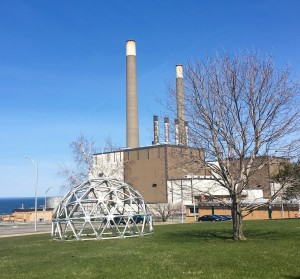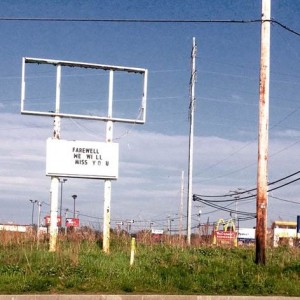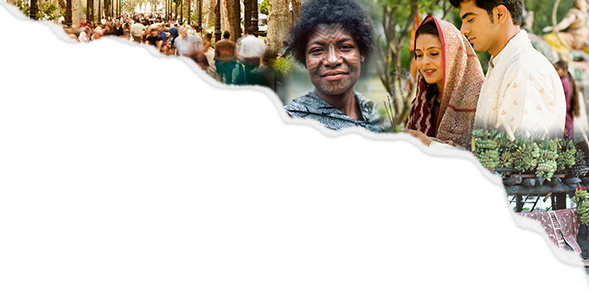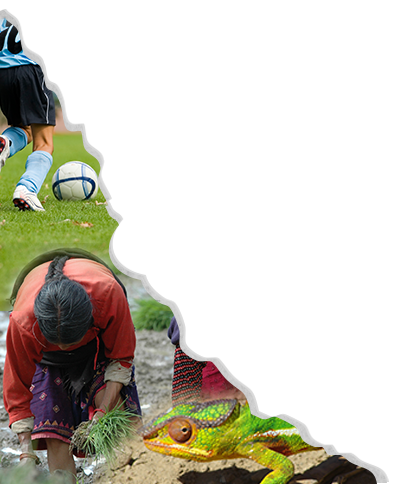This is the first in a two-part post in which Lindsay A. Bell (SUNY Oswego) describes her attempt to organize a senior seminar course around producing a podcast based on student research. As a Canadian, she teaches the course “Life in America: Ethnography & Everyday Experience in the United States and at Its Borders” with sincere curiosity.
 I teach a senior seminar called “Life in America: Ethnography & Everyday Experience in the United States and at Its Borders” at a public university in upstate New York. The course is organized around making a collaborative podcast/audio documentary. We started the term by listening to “This American Life” and then we discussed in what ways it might be anthropological or ethnographic. Following a model proposed by Carole McGranahan, I taught George Marcus and Dick Cushman’s piece “Ethnographies as Texts” (1982 Annual Review of Anthropology) in which they review the state of ethnographic writing and identify nine characteristics of ethnographic realist writing. We debated their list in relation to “This American Life” and then in relation to the four ethnographies we read over the course of the term (listed below). We have been thinking about what would be needed to produce a kind of “This Anthropological American Life.”
I teach a senior seminar called “Life in America: Ethnography & Everyday Experience in the United States and at Its Borders” at a public university in upstate New York. The course is organized around making a collaborative podcast/audio documentary. We started the term by listening to “This American Life” and then we discussed in what ways it might be anthropological or ethnographic. Following a model proposed by Carole McGranahan, I taught George Marcus and Dick Cushman’s piece “Ethnographies as Texts” (1982 Annual Review of Anthropology) in which they review the state of ethnographic writing and identify nine characteristics of ethnographic realist writing. We debated their list in relation to “This American Life” and then in relation to the four ethnographies we read over the course of the term (listed below). We have been thinking about what would be needed to produce a kind of “This Anthropological American Life.”
Pretty early on they settled on wanting to focus on “the rust belt” and what it means to make a future in a place that is often described as not having one. Upstate New York, like much of the region on the southern shores of the Great Lakes, is seen as synonymous with de-industrialization, out migration, high unemployment, and limited job opportunities. Knowing that these caricatures of place obscured more than they revealed, the students set out to cultivate a deeper sense of everyday life in the area. Somehow (I don’t really know how) they became fixated on a local diner that burnt down and then, through various crowd-sourcing initiatives, was rebuilt.
They started by interviewing local people, getting up at 6 am to go to the diner to observe, to meet people, to become more intimate with the town. Like many college towns, our campus is something of an island and travels off campus tend to be either to bars or to Wal-Mart. They quickly figured out that fieldwork is hard, and you don’t always get what you want. They were disappointed in brief answers. They felt interviewees’ discomfort was a sign of their shortcomings as researchers. We watched the long trailer for Christine Walley’s film Exit Zero that deals with life in postindustrial Chicago. At one point, the camera moves about her childhood home as she tries to engage her dad in a conversation about his time working in steel production. He is reluctant. He worries he will be a “downer.” Walley narrates, “He wants to talk; he just doesn’t want to formalize things.” This clip was a powerful conversation starter about class, power, and the challenges interviews always pose. We brought in more guests to interview. Some were people whose project it is to build a future for the town (business developers, planners), others were absorbed in documenting a past soon to be history.
 As we sifted through their data, trying to find the hook, it occurred to me that their own experiences could provide the entry point. College is, after all, about making a future. We decided that the students who were “rust belt kids” would do extended interviews. There was some debate about who was included. We decided the Catskills was no, but Binghamton was yes. We decided the presence of a substantial manufacturing sector was the qualifier. Those from Long Island and “the city” would document their classmates’ life histories and future imaginaries. We did a group interview with three students. My Long Island co-interviewer and I had a loose set of questions. I was so moved by their histories and the kinds of duress they have experienced. As I tried to reflect on the experience after the fact, I found myself in that zone where only insufficient clichés came to the surface.
As we sifted through their data, trying to find the hook, it occurred to me that their own experiences could provide the entry point. College is, after all, about making a future. We decided that the students who were “rust belt kids” would do extended interviews. There was some debate about who was included. We decided the Catskills was no, but Binghamton was yes. We decided the presence of a substantial manufacturing sector was the qualifier. Those from Long Island and “the city” would document their classmates’ life histories and future imaginaries. We did a group interview with three students. My Long Island co-interviewer and I had a loose set of questions. I was so moved by their histories and the kinds of duress they have experienced. As I tried to reflect on the experience after the fact, I found myself in that zone where only insufficient clichés came to the surface.
To facilitate this podcast experiment I have been listening to Jessica Abel’s podcast “Out on the Wire” (a show about writing good stories). She makes it clear that the “protagonists” need to WANT something and that want is what drives the story. After our group had talked for over an hour, I reminded them about this story advice. I asked them about wants. They mainly listed what it was they didn’t want (not to struggle like my mom, not to have a huge basket of bills covering the table where they were supposed to eat, not to be looked down on, not to fail). They are the grandchildren of industrial workers born at a time when most buildings in their hometowns are described in terms of what they used to be. They can’t imagine a future where they go back, but then that leaves the question of where to go.
There is a Ruth Behar quote that I love. She writes, “Call it sentimental, call it Victorian and nineteenth century, but I say that anthropology that doesn’t break your heart just isn’t worth doing anymore.” My heart is all kinds of broken.
Core Reading List
Susan Dewey (2011) Neon Wasteland: On Love, Motherhood, and Sex Work in a Rust Belt Town. UC Press.
Kenneth T. MacLeish (2013) Making War at Fort Hood: Life and Uncertainty in a Military Community. Princeton UP.
Wednesday Martin (2015) Primates of Park Avenue: A Memoir. Simon and Schuster.
Shaylih Muehlmann (2013) When I Wear My Alligator Boots: Narco-Culture in the U.S. Mexico Borderlands. UC Press.
Additional Sources
Lee Baker, Editor (2003) Life in America: Identity and Everyday Experience. Wiley-Blackwell.
Gretchen Purser (2014) “The Circle of Dispossession: Evicting the Urban Poor in Baltimore” Critical Sociology 1-23.
Audra Simpson (2014) Mohawk Interruptus: Political Life Across the Borders of Settler States. Duke UP.
Christine J. Walley (2010) Deindustrializing Chicago: A Daughter’s Story. In Hugh Gusterson & Catherine Besteman (eds.), The Insecure American: How We Got Here and What We Should Do About It. UC Press.
Christine J. Walley (2013) Exit Zero: Family And Class In Postindustrial Chicago. Chicago UP.
Christine J. Walley (ongoing) Exit Zero Project (https://www.exitzeroproject.org/).



